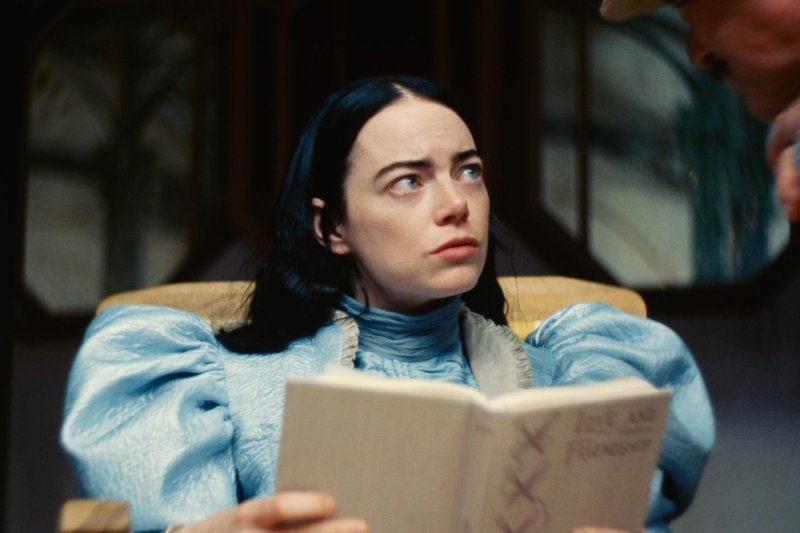1 of 6 | Emma Stone stars in "Poor Things." Photo courtesy of Searchlight Pictures
LOS ANGELES, Dec. 1 (UPI) -- Poor Things, in theaters Dec. 8, is a surreal Frankenstein fable with visuals comparable to the films of Terry Gilliam and Jean-Pierre Jeunet. However, Poor Things explores sex far more than either of those filmmakers' fantasies.
Godwin Baxter (Willem Dafoe) brings a woman he names Bella (Emma Stone) back from the dead. Godwin studies her as she rediscovers life like a newborn in an adult's body.
Stone conveys the wonder of Bella learning how to use her body, taking first steps and finding her balance. Bella also speaks in a childlike language.
Bella learns English words, but uses them more directly than the nuances of speaking language. For example, she calls writing "pen book."
Bella gets more fluent as the film progresses, but doesn't speak completely proper English until the very end.
Godwin can't keep Bella in his lab forever, and eventually she insists on exploring beyond Victorian England. Director Yorgos Lanthimos orchestrates a world that conveys other regions, but in a cinematically artificial way.
Seaside Lisbon looks like it was erected on a soundstage, adding to the sense that Bella's adventure is still dreamlike. So does the deck of an ocean liner in which Bella spends a large portion of her journey.
Wide shots curve through a lens creating even more unreality. The lens makes streets look longer and Godwin's house appear more vast from the inside.
Some of Godwin's experiments are less than scientifically sound, combining animal parts more like Dr. Moreau than Dr. Frankenstein. The fact that Bella refers to him as God makes the not so subtle commentary that he is her creator, flawed though he is.
As soon as Bella discovers the sexual pleasures of her body, it dominates the rest of her story. She embarks on her trip with Duncan Wedderburn (Mark Ruffalo) and experiments with every configuration of sex she can conceive.
Bella still speaks of sex with childlike wonder, and a bluntness that is amusing. She refers to the act itself as "furious jumping."
Bella won't indulge in insincere manners in unfavorable company, not even for a crying baby. She is a pure self-advocate, even when social graces would dictate that she humor braggarts or disapproving elites.
Bella makes logical observations of irrational human behavior because she's discovering it for the first time. Those observations are poignant, even though they confuse her.
For example, Duncan purports to love her, but his possessiveness suggests violence. She confidently shoots down his assumptions of commitment.
Throughout all of this, Bella's smile and laugh never stops being endearing. She never stops exploring sex, either.
Bella is unphased by any sexist double standards, and she simply does not give unreasonable men any thought.
Eventually, Bella witnesses societal misfortunate that even her naivete cannot obscure. It touches her and her powerlessness to spare everyone from harm is even more difficult to accept because she is so open and giving of herself.
Tony McNamara's adaptation of Alasdair Gray's book creates a winning character through whom to view humanity. The combination of whimsy and sex positivity is certainly unique in the annals of cinema.
Fred Topel, who attended film school at Ithaca College, is a UPI entertainment writer based in Los Angeles. He has been a professional film critic since 1999, a Rotten Tomatoes critic since 2001, and a member of the Television Critics Association since 2012 and the Critics Choice Association since 2023. Read more of his work in Entertainment.















